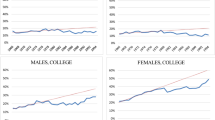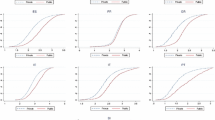Abstract.
This paper uses quantile regressions to describe the conditional wage distribution in Portugal and its evolution over the 1980s as well as the implications for increased wage inequality. We find that, although returns to schooling are positive at all quantiles, education is relatively more valued for highly paid jobs. Consequently, schooling has a positive impact on wage inequality. Moreover, this tendency has sharpened over the period. We also find that most of the estimated change in wage inequality was due to changes in the distribution of the worker's attributes, rather than to increased inequality within a particular type of worker.
Similar content being viewed by others
Author information
Authors and Affiliations
Additional information
this version: January 2000
Rights and permissions
About this article
Cite this article
Machado, J., Mata, J. Earning functions in Portugal 1982–1994: Evidence from quantile regressions. Empirical Economics 26, 115–134 (2001). https://doi.org/10.1007/s001810000049
Issue Date:
DOI: https://doi.org/10.1007/s001810000049




